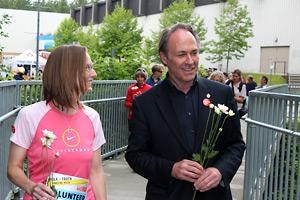A Walk for Truth-Asbestos Kills attracted over 100 participants as well as 30 people from out of town who attended the event on Sunday, June 10.
The walk was organized by the AREA (Asbestos-related Research, Education and Advocacy) Fund, an organization that was created by the Ford family after Dave Ford, a Powell River resident who worked at the paper mill, died from mesothelioma, a terminal form of cancer caused by asbestos in the lining of the lungs.
Winnipeg MP Pat Martin, who actively campaigns to have Canada ban the production and exporting of asbestos, said Canada’s position on asbestos is morally and ethically reprehensible. “I love my country, but I hang my head in shame that we are the world’s number one cheerleader for the asbestos cartel and that asbestos is not banned in this country. We are actively exporting it, as much as 200,000 tons a year into unsuspecting, developing nations and third world countries.”
Martin reached out to Powell River Mayor Dave Formosa, who participated in the walk, pointing out that Powell River has the largest cluster of asbestos-related diseases in BC, while Sarnia, Ontario, has the same distinction in eastern Canada. He encouraged Formosa to contact Mike Bradley, Sarnia’s mayor who has taken an active role to lobby the provincial and federal governments about asbestos. “It would be wonderful if the two of you could talk sometime and let them know they’re not alone,” Martin said to Formosa. “Federal, provincial and municipal leaders have to speak out if Canada is ever going to get out of this appalling industry.”
Asbestos-related diseases are the number one occupational killer in BC and across Canada. It’s estimated that over 1,500 people in BC will die from asbestos-related diseases over the next five years. Approximately 26,000 workers in BC are still at risk of exposure to asbestos in the workplace.
Mike Verdiel, president of Local 76 of the Communications, Energy and Paperworkers’ Union of Canada, gave an emotional and passionate speech about the dangers of asbestos for industrial workers. “When you think about the people who have passed away, there is no reason why they should have passed away,” he said. “We should have known sooner and today we do know.”
However, some workers ignore the risks and question why they have to follow safety procedures, Verdiel said. “We are our own enemies at times by not following the rules we have in place.” Scott McCloy, director of community relations for WorkSafeBC, said workers continue to be exposed to asbestos, particularly in the renovation and demolition industry, because of inattention to safety procedures and a poor understanding of the deadly nature of asbestos. “In 2011 we accepted more than 60 fatality claims for asbestos-related diseases,” he said. “That was nearly half of all the fatality claims that we had last year and it’s been that way for about the last 10 years.”
In the last decade, nearly 600 workers have died of asbestos-related diseases, McCloy said. “That’s a staggering number of people and it’s horrible,” he said. “In fact, more men and women have died from asbestos-related diseases than any other workplace hazard in our history.”
There is no safe level of exposure to asbestos, he said, adding even one exposure can result in contracting asbestos-related disease, particularly mesothelioma.
Ross Cooper gave a moving account of his father’s life and death. Graeme Cooper died of mesothelioma two years ago. Although he worked for Canada Trust for 38 years, one of his summer jobs when he was a teenager was to assist in demolishing a building. His father inhaled dust and asbestos settled in his lungs, Ross said, but he wouldn’t be aware of it until over 50 years later when he noticed his breathing was becoming more laboured. “When a healthy 16 year old who, as a result of not knowing any better, surrounded by others that don’t know any better, has a single exposure, that starts a time bomb that ends an otherwise healthy life earlier than intended, then the effort to gather and pay attention is very important,” Ross said.
Other speakers were MLA Nicholas Simons, Tracy Ford and Dr. Chris Lee, a medical oncologist in BC.
More information about the AREA Fund is available at www.areafund.ca. WorkSafeBC has also launched a website about asbestos.



